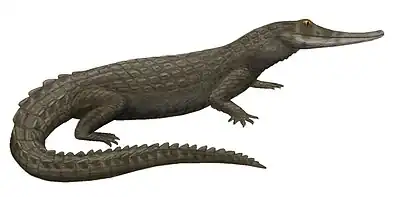| Bernissartiidae Temporal range: Early Cretaceous, | |
|---|---|
 | |
| Life restoration of Bernissartia | |
| Scientific classification | |
| Domain: | Eukaryota |
| Kingdom: | Animalia |
| Phylum: | Chordata |
| Class: | Reptilia |
| Clade: | Archosauria |
| Clade: | Pseudosuchia |
| Clade: | Crocodylomorpha |
| Clade: | Mesoeucrocodylia |
| Clade: | Metasuchia |
| Clade: | Neosuchia |
| Family: | †Bernissartiidae Dollo, 1883 |
| Genera | |
Bernissartiidae is an extinct family of neosuchian crocodyliformes known from the Early Cretaceous.[1] Bernissartiid fossils have been reported from Belgium, France, Spain, England, Tunisia and the United States. It currently contains two genera, Bernissartia from the Barremian aged Sainte-Barbe Clays of Belgium and Koumpiodontosuchus from the equivalently aged Wessex Formation in southern England.[2] Members of this family display adaptations for a durophagous lifestyle, especially the heterodont dentition of Koumpiodontosuchus. Indeterminate remains have been reported from the Oum ed Diab Member of Tunisia, the Cloverly Formation and Arundel Clay of the United States, and the La Huérguina Formation, Blesa Formation, Villanueva de Huerva Formation, El Castellar Formation, Camarillas Formation and El Collado Formation of Spain, and the Angeac-Charente bonebed in France.[3]
References
- ↑ Dollo, L. (1883). "Première note sur les crocodiliens de Bernissart [First note on the crocodilians of Bernissart]". Bulletin du Musée Royal d'Histoire Naturelle de Belgique. 2: 309–338.
- ↑ Sweetman, S.; Pedreira-Segade, U.; Vidovic, S. (2014). "A new bernissartiid crocodyliform from the Lower Cretaceous Wessex Formation (Wealden Group, Barremian) of the Isle of Wight, southern England". Acta Palaeontologica Polonica. doi:10.4202/app.00038.2013.
- ↑ "Fossilworks: Bernissartiidae". fossilworks.org. Retrieved 17 December 2021.


